- Home
- Brian Garfield
Marshal Jeremy Six #6 Page 7
Marshal Jeremy Six #6 Read online
Page 7
“Yeah,” said Lanphier in a dull voice. “I guess it did, Larry.”
Six
Helped along by friendly bartenders, Cruze’s Terrapin men were getting themselves liquored up in saloons all over town. Six kept a close eye on them, but treated them with amiable,
backslapping courtesy, letting them know he was all in favor of their having a good time. He cruised the rounds of the town’s nightspots, getting the Terrapin hands used to seeing him around.
He was coming out of the Tres Candelas when he heard the boom of the gunshot. It wasn’t far away. He got up on his toes and sprinted for the corner, and went around with his gun up. It was probably just some drunken cowboy overenthusiastically shooting at the sky, but in Six’s line of work it did not pay to take things for granted.
The first figure he recognized was Larry Keene’s; the second was Gene Lanphier’s. When he came up to the boardinghouse he saw the corpse sprawled on the walk in the open gateway.
A quick glance was enough to tell him that whatever the danger was, it was past. He put his gun away and pushed past the two onlookers at Keene’s shoulder.
“What happened here, Larry?”
Keene glanced over his shoulder. “Jesus, Jeremy, you showed up fast as the telegraph, didn’t you?”
“What happened?” Six said again.
Gene Lanphier said, “I killed him, Marshal.”
Shock set Six back on his heels. “You killed him?” He knelt by the corpse and the dead man’s features became recognizable in the rain. “Fred Hook.”
Larry Keene said, “Hook drew first, Jeremy. We all saw it. He drew first and pulled trigger first, but his gun misfired. Before he could get it cocked again, Gene shot him.”
Six got to his feet. He tugged his hat down and looked from face to face. “You two boys agree with what Larry saw?”
“That’s just what happened,” one of the men said, and the other nodded his head.
Six turned to the gunsmith. “What about it, Gene? Why’d this happen?”
Lanphier’s eyes were averted. “I’d rather not talk about it right now. I’ve got to get home.”
“Not before you tell me what it was all about, Gene.”
“Now look,” Lanphier said, “my wife needs me and I’ve got to get home. If you—”
Larry Keene said softly, “Before the shooting started, you told Hook you were going to kill him for what he’d done to your wife. Something happen to Sheila, Gene?”
Lanphier’s eyes, dull as slate, turned toward him. “Yeah,” he said. “Something happened. Hook tried to rape her.”
There was a silence, as abrupt as an intake of breath; it stretched across the pelting drizzle until curious people started to appear and drew closer to find out what had happened.
Lanphier turned to Six and said, “He didn’t get it done because she got hold of his knife and sliced him across the back. I reckon you can check with the doctor, or look under his coat there if you’ve a mind, but I’d take it unkindly if you came around badgering Sheila with any questions right now.”
Keene murmured, “The unwritten law, Jeremy. I’d say it was as clear a case of justifiable homicide and self-defense rolled into one as I’ve ever heard of.”
“It looks that way,” Six agreed. “But I wasn’t exactly expecting trouble to come from your quarter, Gene.”
“I did what I had to do,” Lanphier answered. “Throw me in jail if you want, or let me go home. But make up your damn mind.”
“Simmer down, feller,” Six told him gently. “There’ll be a coroner’s inquest into Hook’s death, but right now I don’t see any reason why you shouldn’t go on home. Anything any of us can do for Sheila?”
“Just leave her be and don’t pester her with questions until she’s had time to get over this,” Lanphier said, and walked away, shoulders bent.
He dissolved into the misty darkness, and Larry Keene said, “Reckon he’s in worse shape than she is right now. Gene ain’t no killer. I don’t guess this sets too well on his stomach.”
Six nodded wearily. “All right. Maybe a couple of you boys’ll give us a hand getting Hook off the street.”
Danziger was tying his horse up behind the ice house when he heard the single shot across town. His head reared back and he stood listening for quite a while, but when there was no further sound of ruckus, he went on doing what he was about. Hanratty had told him, When you’ve sized up the job and you’re ready to make your kill, saddle your horse and leave it out behind the ice house. When I see your horse there I’ll know you’re doing the job. You get it done and get to your horse, and you’ll find seven thousand dollars in greenbacks in your saddlebags. After that you’ll be on your own.
Danziger tied the horse and glanced around at the deserted alley. He might as well get it over and done with. The sour green taste on his tongue, like bile, was bound to sit there for a long time to come, but it would get worse if he stopped to think about it. He didn’t care about the seven thousand dollars. It was the threat of Steve Boat, which Hanratty had used against him, that had stirred him to do the Irishman’s bidding.
There wasn’t any reason to stall. Jeremy Six had pointed out the girl to him this afternoon, and he’d found out her room number when he’d signed the hotel register. It was better not to know any more than that. All he had to do was kill Marianne Holbrook and get on his horse and run. The seven thousand would be enough to take him to South America and keep him drunk for a good long time. By the time the money ran out, maybe somebody would kill him.
Cort Danziger left the horse in the alley and trudged through the mud toward the street. Before he reached the lamp-lit area he stopped, pulled a hip-flask from his pocket, and drank deep. The raw whisky seared his tongue and scorched his throat and charred his belly. It rocked him and made him blink. He drank again, and then the flask was empty. Meticulously he lidded the flask and slipped it back into his pocket, arranged his raincoat, and stepped out onto the boardwalk.
He went slowly up the street—slowly, so that he would not stagger; he was pretty well drunk. His vision, less than fully clear, swept along the far side of the street and came to rest on a squat figure of a man in a railroad cap. The bill of the cap lifted and turned, displaying Eddie Hanratty’s interest in Danziger’s passage. The red button-tip of a cigarette in Hanratty’s fist lifted from waist-level to mouth, brightened and dimmed, and dropped away.
Danziger went past and continued toward the hotel. Before he reached it he looked back, and saw Hanratty disappearing down the street, walking fast.
With no expression at all on his face, Danziger turned into the alley beside the hotel and backed against the shadows. He felt sick and it took an effort of will to keep from bending over and retching in the mud. He touched the gun under his coat and rehearsed what he was about to do: go back to the girl’s window and take aim through the glass, shoot once, and run for the end of the alley. He would come out on the farther street and walk, not run, two blocks to the freight yard, where he would turn the corner and go one block and turn another corner, and in that manner make his direct way to the horse behind the ice house. There were two full bottles of whisky in the saddlebags—or there would be, if Hanratty didn’t steal one or both of them while putting the money there.
And suppose Hanratty didn’t pay off? Suppose he just walked into a saloon and laughed to himself? You couldn’t put that kind of thing past a man who’d hire a gun to kill a girl. You couldn’t put anything past him. And what if Hanratty did that?
Danziger thought about it, standing hunched in the rain. Pedestrians hurried along the walk, up at the street opening of the alley; their shadows flitted past.
Hanratty wouldn’t be likely to be that stupid. He had taken one or two chances with Danziger the other night, possibly to test Danziger and find out how much sand he still had left in him. But Hanratty wasn’t likely to take the chance that a blooded killer like Cort Danziger would be willing to leave him scot-free if he didn’t come acr
oss with the promised payment. Danziger might be rum-sodden, worn out and seedy, but he still had a certain cleverness that Hanratty wouldn’t underestimate. Hanratty knew that nobody, Danziger nor anyone else, would set up a woman for a kill without making some effort to cover his own tracks. Danziger wasn’t likely to stand out in the street in broad daylight and gun her down. He’d do it silently in the dark, or unseen from ambush; he’d do it in such a way that he wasn’t likely to get caught or fingered right away. And if nobody knew who had killed the girl, Danziger wouldn’t have to run. Not right away. He’d have plenty of time to hunt down Eddie Hanratty if Hanratty double-crossed him.
Hanratty would know that. No, he wouldn’t be fool enough to renege. The money would be there in the saddlebags when Danziger went for it.
All he had to do was kill the girl first.
He started back alongside the hotel’s outside wall, moving one step at a time, reluctantly threading the alley. Voices behind him made him freeze; he turned cautiously, one shoulder against the wall, and peered back through the darkness. Two of Wade Cruze’s Terrapin cowhands were standing at the mouth of the alley, swaying drunkenly and talking in loud, coarse tones. They didn’t seem to present any danger, but Danziger couldn’t make his move until they went away. He waited where he was. He picked up some of their talk—it seemed the town gunsmith had killed one of Cruze’s hired gunslingers in a fair fight, and the two drunk cowboys were discussing it with vast gestures of their arms and highly amazed expressions of disbelief.
One of them had a bottle. They stood stubbornly right there in the alley, not moving. Why didn’t they go away? They didn’t have sense enough to get in out of the rain. Danziger swore paragraphs of bitter oaths—silently. They couldn’t see him in the dark heavy shadows, but they could hardly fail to miss seeing him if he went back and fired a shot into a window. God damn it, why didn’t they leave? He licked his lips and shook his head. The effect of the whisky he had drunk was already beginning to wear off, and he didn’t think he could face the idea of shooting an unarmed girl from ambush, not sober he couldn’t. It was hard enough to do it drunk.
The secret was not to think about it. Don’t think, just do it. But what else was there to think about? The future? The rest of his life on the run, maybe forgetting his troubles now and then when he got so drunk he couldn’t think at all. Nights of staring sleeplessly at some dark flyblown ceiling and days of staggering from cantina to cantina, trying to drink the tequila production of Mexico dry. No good thinking about that. The past? All he could think of was the night that had finished him, the night when his life had blown up in little pieces, the night that had never ended: it was that night that had put him where he was right now. There’d been a time when he’d been a man to reckon with. No more. Now he was just a fading drunken tramp seizing his last thin chance to make enough money to drink himself to death.
He couldn’t remember when he had last slept without first drinking himself into a stupor.
That night. He couldn’t get his mind off it, now that he’d reminded himself. It was a woman that night, too—a young and pretty woman going down with a bullet in her.
Steve Boat’s woman, he thought bleakly. Her ghost would trail him to his grave—and her ghost took the shape of Steve Boat with a gun in his hand. He had a vivid picture in his mind of Steve Boat—a tall young man with prematurely white hair, even white eyebrows. A fancy black coat thrown back to expose the mother-of-pearl handles of a matched pair of wicked six-guns in a cross-belted black gun rig. Steve Boat was a killer, but there was a time—before that night—when Danziger could have faced him, faced him and drawn faster and walked away the victor.
Not anymore. Steve Boat had his own righteousness, and the never-dying, smoldering burn of Danziger’s conscience, on his side. Danziger knew he could never face Steve Boat and draw against him. If Steve Boat caught up with him, he’d just stand there and take it without lifting a finger while Boat pumped twelve .44 slugs into him.
How could you fight the man when you’d killed his wife?
It seemed forever. Finally the two drunken Terrapin cowhands wandered away into the street. The alley was empty, steamy and wet, clammy with a listless current of air that chilled Danziger’s cheeks and raised goose bumps on his flesh.
He stepped away from the wall and walked back along the side of the hotel. He passed the lobby window, intending to go by and continue back to the girl’s bedroom, but a glance through the lobby window halted him in his tracks. The window was open a crack, enough to admit air but not wide enough to let the drizzling rain inside. Beneath the inverted vee of the curtains he could see across the length of the lobby. A girl was sitting with her profile to him, sitting in a lounge chair reading a week-old Tuscon newspaper ... Marianne Holbrook. Not fifteen feet away from him. She made a perfect target—motionless, unsuspecting, fairly well lighted by the reading lamp that stood behind her shoulder.
Danziger clenched his jaw to keep his teeth from rattling. He looked both ways along the alley. It was risky. From here it was a forty foot run to the back end of the alley. If he shot her now, he’d have to make that run afterward. Suppose somebody was passing on the street and heard the shot? He might be spotted before he could get to the far end of the alley. He looked down the length of it again. It was pitch dark. The only lighted window was the one by him. Once he passed beyond its swath of illumination, he would be in total blackness. Someone at the mouth of the alley might conceivably see a running shape, but no one could possibly recognize him once he left the lighted window. But suppose somebody on the farther street saw him coming out of the alley?
He shut his eyes tight and told himself that he could make any number of elaborate plans and still find something that might possibly go wrong. Don’t think about it. Just do it. Do it and get it over with. If they caught him they’d shoot him or lynch him or put him on trial and hang him. He’d seen a few men hang. They flopped around like decapitated chickens. To hell with it. If they caught him and killed him then he wouldn’t have to worry about anything anymore. Let them catch him.
He reached under his coat and wrapped his fist around the gun. Lifted it clear of the holster and curled his thumb over the hammer. But he didn’t lift the gun out of his coat. Not yet. He had never intentionally killed a woman. Even Boat’s wife—that wasn’t deliberate. And this was from ambush, from the dark. The coward’s way.
Danziger caught himself. What was he if not a coward? If he could do it at all, this was the only way.
Don’t think. Do it.
There was, at last, that final twinge in him—not conscience, not righteousness, but the overriding last-ditch grip of a man’s inborn sense of self-preservation. A man could pretend he had resigned himself to death, but when the moment came he was never willing to accept it.
And so his hand paused, only briefly, while fear touched him and told him that he was not beyond fear for his life, that at rock-bottom he did not really want to commit this act that was likely to condemn him to death.
It didn’t last long; he didn’t let it. He was lifting the gun, cocking it, readying his aim, when a man walked into the frame of his vision—Jeremy Six, walking into the hotel lobby and stopping to talk to Marianne Holbrook.
Danziger’s mouth opened and closed. He eased down the hammer of the six-gun. It was dangerous here in the light of the window; he stepped aside, out of the illumination, and stood in darkness beside the window sash. He could no longer see into the lobby, but he could hear their voices through the two-inch opening at the bottom of the window. Six had said good evening and the girl had replied in a friendly way, and they had started to discuss the weather and then to talk about the girl. Six evidently had stepped inside to dry out for a moment before continuing his rounds in the rain. It was one of those crazy accidents. If Danziger hadn’t hesitated momentarily before cocking his gun, he’d have shot the girl before Six appeared—and Six probably would have caught him within a block.
Six was saying, �
�McQuarter tells me you’re having a birthday soon.”
“Sunday,” she answered. “I feel terribly old. I’ll be twenty-five, you know.”
“One foot in the grave,” Six agreed dryly.
“That’s a strange look you’re giving me,” the girl’s voice said. Danziger listened closely to the tones of her voice—mellow, easy flowing, not fluttery or giggly. She said, “You’re wondering why I’m not married, is that it?”
“A man can’t help wondering little things like that about a girl as attractive as you.”
“Thank you,” she said, with a small laugh in her throat. There was a dusty, husky edge on her voice—woman, not girl. Danziger began to sweat. He wished he’d never heard her speak. It would make the job harder.
The girl said, “I was married, Marshal. My husband was killed at Wounded Knee.”
“I’m sorry,” Six said. “I’m afraid I put my foot in my mouth, didn’t I? I do remember you told me you’d grown up with the Army.”
“An Army brat, yes. I married a Cavalry officer. He was a young lieutenant. I hardly remember him now—isn’t that strange?”
Danziger faded back along the wall until he was out of earshot. He didn’t want to listen any more. He wished Six would get the hell out of there.
What was it she’d said—her twenty-fifth birthday, this coming Sunday? He remembered what Eddie Hanratty had told him, out by the Coronado Springs relay station: I want the girl dead by Saturday midnight. It couldn’t be coincidence; there had to be a connection. It looked obvious. The girl would probably come into an inheritance on her twenty-fifth birthday. Somebody didn’t want her to get it. She was worth seven thousand dollars to somebody, dead. Not Hanratty—Hanratty was very clearly somebody’s errand boy. Somebody who could afford to pay seven thousand dollars to see that the girl didn’t live to become twenty-five years old.

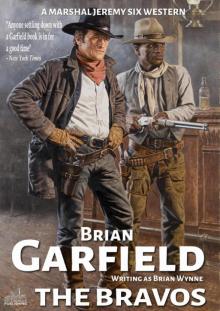 Marshal Jeremy Six #3
Marshal Jeremy Six #3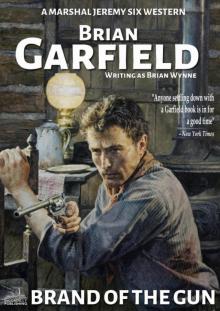 Marshal Jeremy Six #6
Marshal Jeremy Six #6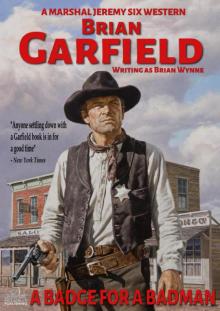 Marshal Jeremy Six #5
Marshal Jeremy Six #5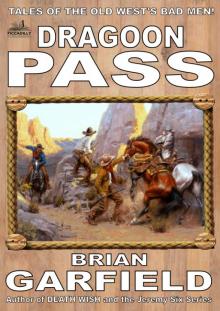 The Outlaws 2
The Outlaws 2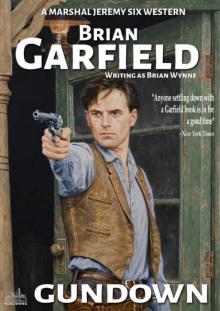 Marshal Jeremy Six #7
Marshal Jeremy Six #7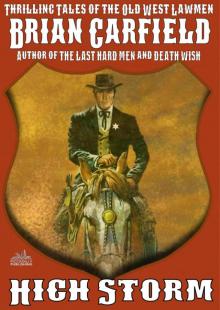 The Lawbringers 4
The Lawbringers 4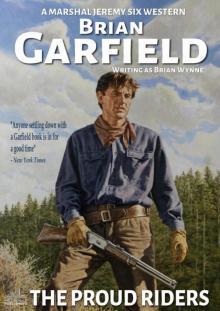 Marshal Jeremy Six #4 the Proud Riders
Marshal Jeremy Six #4 the Proud Riders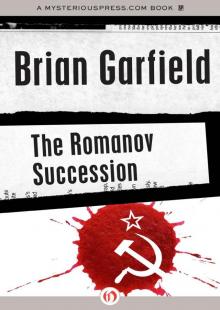 The Romanov succession
The Romanov succession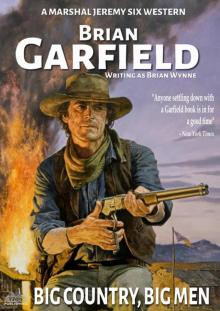 Marshal Jeremy Six #8
Marshal Jeremy Six #8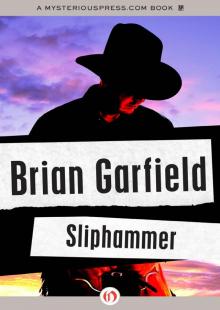 Sliphammer
Sliphammer Line of Succession
Line of Succession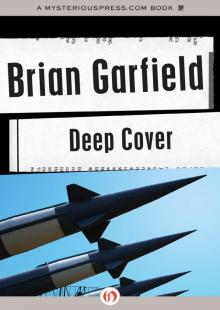 Deep Cover
Deep Cover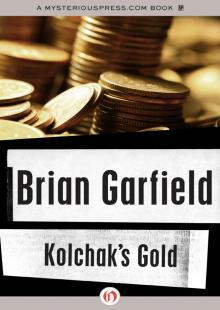 Kolchak's Gold
Kolchak's Gold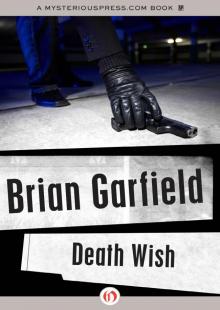 Death Wish
Death Wish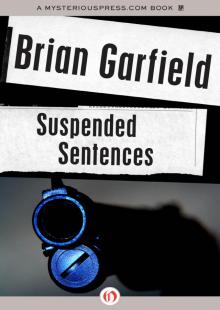 Suspended Sentences
Suspended Sentences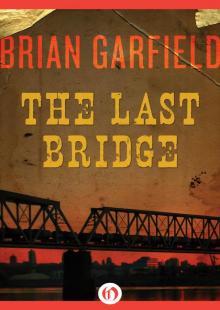 The Last Bridge
The Last Bridge Relentless
Relentless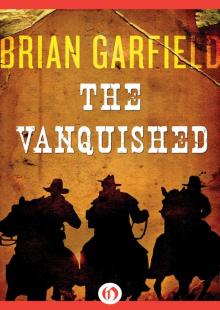 The Vanquished
The Vanquished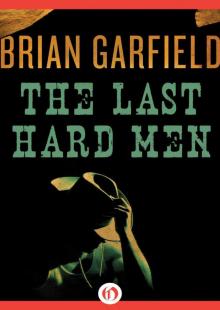 The Last Hard Men
The Last Hard Men Hit and The Marksman
Hit and The Marksman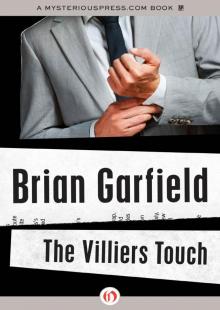 Villiers Touch
Villiers Touch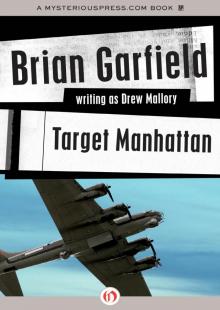 Target Manhattan
Target Manhattan Marchand Woman
Marchand Woman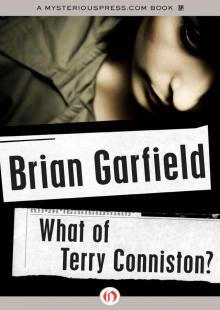 What of Terry Conniston?
What of Terry Conniston?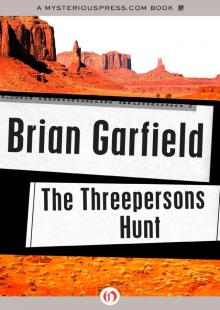 Threepersons Hunt
Threepersons Hunt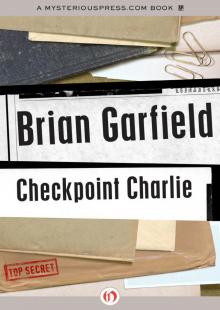 Checkpoint Charlie
Checkpoint Charlie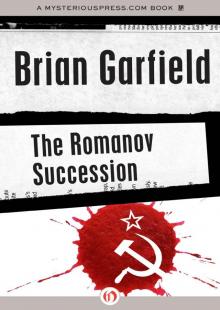 Romanov Succession
Romanov Succession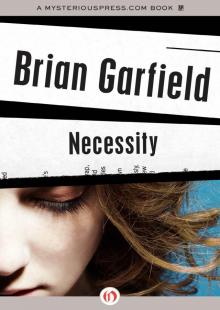 Necessity
Necessity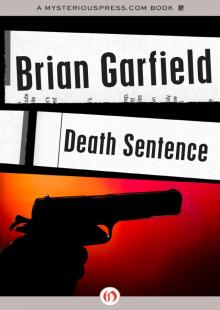 Death Sentence
Death Sentence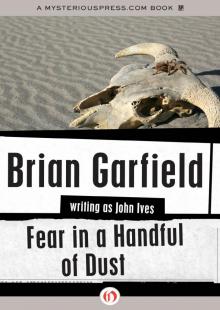 Fear in a Handful of Dust
Fear in a Handful of Dust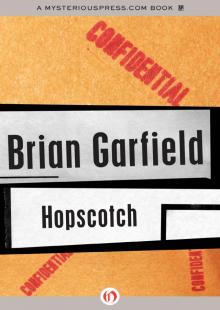 Hopscotch
Hopscotch